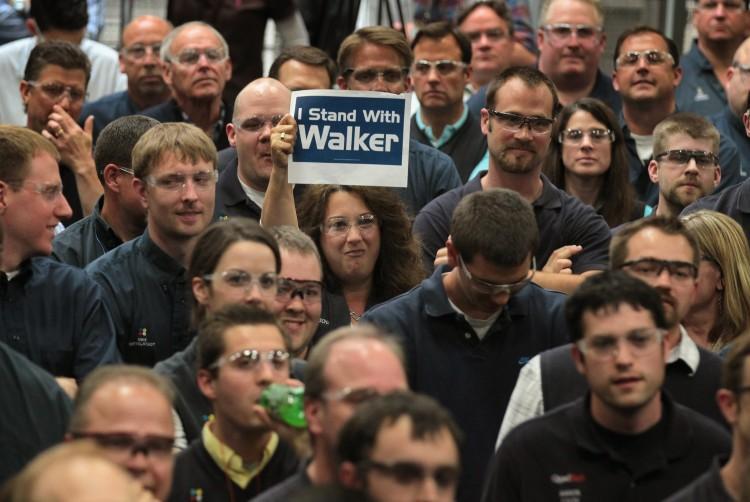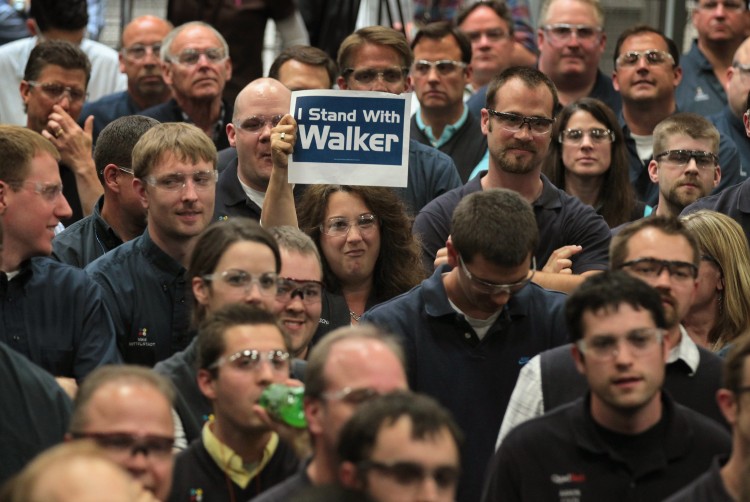The decision Wisconsin voters make on Tuesday over whether to recall Republican Gov. Scott Walker will resonate far beyond the borders of the Midwest state.
Reported as one of the most expensive statewide contests in American history, the result will have implications for unions, Republican conservatives, other state elections, and ultimately the general elections come November.
It is only the third time a U.S. governor has had to face a recall. Elected in 2010 on a conservative platform to reduce the state budget deficit, Walker’s plans included cutbacks in education and public spending. But it was the bill to effectively end most public workers’ collective bargaining rights that fired up Democrats and workers unions, and spawned the recall effort.
Thousands took to the street to protest, even in the state capital. Enough signatures were collected for recall petitions forcing Walker and also four GOP state senators to elections this Tuesday.
The lieutenant governor faces Milwaukee Mayor Tom Barrett, a Democrat who has not only had to fight a difficult primary but who also lost to Walker in 2010, albeit marginally.
According to Wisconsin Public Radio’s (WPR) Shawn Johnson, Wisconsin has never experienced a campaign like it, particularly in dollar terms.
“The old record for [the] governor’s race in terms of money raised by a candidate was about $10 million,” Johnson told NPR. “And that was set in 2010 by Gov. Scott Walker. He’s now raised $31 million dollars in about a year and a half.”
Johnson said the issues at stake were ones other Republican governors were fielding. If Walker survives, “It'd be big,” he said.
That is certainly the view of Republicans. By taking on labor unions, Walker’s status has been elevated, and a win on Tuesday will provide a boost to the conservative agenda in the national elections.
Over 60 percent of funds for Walker have come from outside the state, according to the Center for Public Integrity (CPI). The biggest source of the funds has been the Republican Governors Association (RGA), spending around $4 million on campaign ads alone through its Right Direction Wisconsin PAC since April 23.
The RGA does not have to report the source of funds outside the state, according to Wisconsin regulations, but it does to the IRS, the CPI reports, noting that a $500,000 donation was made from the U.S. Chamber of Commerce and a $1 million donation from David Koch in February.
Unions, impacted by Gov. Walker’s limiting of collective bargaining rights, have also poured millions into the recall effort. Over the last year, the Service Employees International Union (SEIU), American Federation of State, County, and Municipal Employees (AFSCME), and the National Education Association (NEA) “have channeled at least $2 million from their treasuries and super PACs to two Wisconsin-based independent expenditure groups,” according to a June 2 MSNBC Open Channel report.
The NEA on March 7 transferred $3 million to the its Super PAC, the NEA Advocacy Fund, which then “sent $500,000 to the We Are Wisconsin Political Fund, a state-based independent expenditure group headed by the state AFL-CIO’s president,” according to MSNBC.
Republican Presence
Wisconsin has drawn a bevy of Republican celebrities. New Jersey Gov. Chris Christie, one of the most popular Republicans in the country, has campaigned with Walker, along with South Carolina Gov. Nikki Haley and Louisiana Gov. Bobby Jindal.
“This is an election that will send shock waves throughout America,” Senior Rep. Paul Ryan (R-Wisc.) told a crowd of several thousand tea party supporters while stumping for Walker last week. “It is a momentum maker or a momentum breaker. The stakes are as high as they ever could be.”
For Democrats, Wisconsin is seen as a critical swing state in the national elections. Obama won the state in the 2008 elections, but Republicans bounced back in 2010. While Obama has endorsed Tom Barrett, he has remained largely quiet, leaving it up to Bill Clinton to step up for the Democrat candidate. Clinton said he was not in favor of recalls, but noted that “sometimes it is the only way to avoid a disastrous course.”
“If Tom Barrett wins, I think it will be because it'll show that people favor cooperation over conflict and that’s really what the American people have to say,” he told supporters in Wisconsin last week. “This is not about liberal/conservative, Republican/Democrat anymore. It’s about whether you want constant conflict and winner-take-all or creative cooperation.”
“What’s working in America—the places that are back—are places that are working together.”
Democrats have also been restricted by Wisconsin campaign laws that free the incumbent from the usual campaign finance contribution limits, but not the challenger this time, Tom Barrett.
“People can’t give him [Barrett] more than $10,000 a pop, and he’s raised about $4 million in the cycle,” WPR’s Johnson said. “Normally we'd be talking about that being [a] record-setting pace, but he’s getting killed in Wisconsin, he’s getting killed on the airwaves, because the governor has just destroyed all records.”
Walker has been leading Barrett in the polls although a Public Policy Poll (PPP) released Friday indicated that the race had tightened over the last three weeks, with Walker ahead of Barrett by just 3 points, at 50 to 47.
While the issue has polarized the state with both sides lining up for Tuesday, PPP believes the ultimate determinate will be the level of engagement on the issue across the board.
“Barrett is actually winning independent voters by a 48–46 margin,” PPP said in a statement. “The reason he continues to trail overall is that Republicans are more excited about voting in Tuesday’s election than Democrats are.
“It’s cliché, but this is a race that really is going to completely come down to turnout,” the pollsters said.
The Epoch Times publishes in 35 countries and in 19 languages. Subscribe to our e-newsletter.





